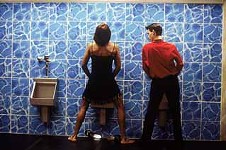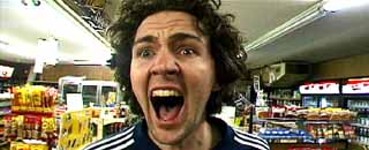Mr. Easy Rider Takes a Wild Flyer
Peter Fonda Strikes the Father Lode in Ulee's Gold
By Russell Smith, Fri., June 27, 1997
|
"Ulee's Gold has blasted me right out my pigeonhole and into a bluebird's nest" -- Peter Fonda |
I said, even though you know what you know/ I know that I'm ready to leave/Because you're making me feel like I've never been born.
That, for the most part, has been the book on Prince Peter the Lesser: goofy, a bit pathetic, and lamentably out of synch with the zeitgeist at any given moment. But if it weren't for semi-apocryphal history of this sort, Fonda would have little history at all. After debuting in Tammy and the Doctor (1963) and cultivating his freak flag-flyin' rebel image in Roger Corman-directed American International Pictures B-flicks (most notably 1966's The Wild Angels), he enjoyed a brief spasm of critical success producing and acting in the hippie culture monolith Easy Rider (1969) and directing the passable Western drama, The Hired Hand (1971). Since then, there's been a quarter century of acting constantly and badly in crap action and sci-fi movies like Killer Force, Futureworld, and Mercenary Fighters. As if the wretchedness of these films weren't indignity enough, Fonda has tended to draw cartoonish psycho/misfit/drug casualty roles that heaped dung on the receding memory of his modest early accomplishments.
Adding to the ignominy of it all was kid sister Jane's steady accumulation of Academy Awards and nominations, and the varied and well-regarded work of daughter Bridget. The only Fonda, it seemed, who wasn't holding up his end of the family acting legacy was Peter.
"I was aware of Peter's reputation as the Candide," Nunez recently told a New York Times interviewer. "In most of his screen performances he's played the fool. I think you can respond to a tightfisted father by being a clown, and I think Peter did that."
But now, in one of those blessed and wholly unexpected intimations of a benign cosmic force, redemption has come to Peter Fonda at the age of 58. His role as emotionally stunted widower/family patriarch Ulysses Jackson in Ulee's Gold is not only a career break, but a triumph of a magnitude that should inspire wholesale reevaluation of his place in film history.
Ulee Jackson, a Vietnam veteran resigned to a nondescript life of beekeeping and raising the daughters of his imprisoned son, is a solid citizen and reliable provider. He's also as obscure to his family and friends as those microscopic bugs embedded in Martian asteroid fragments. Monosyllabic, impassive, and utterly incapable of sharing any non-tangible aspects of his being, he baffles and frustrates outsiders who are instinctively drawn to the basic goodness they sense in him. By most accounts, Ulee Jackson is the shade of Henry Fonda reanimated in the face, limbs, and voice of his only son. The near-universal critical praise that Peter Fonda's performance is drawing has not only stolen the thunder of Nunez's long-awaited return to the screen (this is the director's first movie since 1993's Ruby in Paradise) but given the self-effacing actor a level of respect that's eluded him since, well, birth.
A weary but audibly elated Fonda acknowledged the out-of-the-blue character of his breakthrough during a recent phone interview from Los Angeles.
"To use an old Sixties phrase, it's blowing my mind," he said in a teenager's voice thickened only slightly by aging lungs and vocal cords. "I'm simply astonished, first that I was given a shot at a part this good, and then that I've had the chance to work with a director of Victor Nunez's caliber and this tremendous cast. You never expect an opportunity like this, and certainly not at my age."
Nunez has been vague about what moved him and casting director Judy Courtney to take their wild flyer on Peter Fonda, but the Ulee Jackson character is so patently the type that Fonda pere specialized in during his latter career that, the more you think about it, the more it makes sense.
"Plenty of other guys had a shot at this, I know," Fonda said. "Nick Nolte turned it down. Scott Wilson also read for it, I'm pretty sure, and lord only knows who else. So when I first walked into that room to do my reading I was nervous as hell. My hair was down to my shoulders then. Of course I was ready to cut it if they said the word, but that was the first time they laid eyes on me, so I wondered how they were gonna respond to me. But just then I felt something coming from Victor, reaching out to me. It was like a massive weight lifting itself off my shoulders. I knew then that it was going to work. Afterward, Victor said, `It's time for us to open up a bottle of red wine and celebrate.'
"Basically, I saw this role as an enormous trust that I couldn't betray. You know what I mean? I'd never done a character like Ulee before, but I tell you what: It's blasted me right out of my pigeonhole and into a bluebird's nest."
Ironically, for a man defined by protracted adolescence, the greatest obstacle to winning the role of his life was the need for a credibly timeworn look. "I was alarmed when I first cut my hair," Fonda recalls. "It took 10 years off me just like that. I thought, man, how am I gonna pull this off? But then I just told myself, `Hey, come on Peter; it's called acting!'"
Clearly, though, Fonda had long, intimate access to resources not available to the competition. The weary, upright, more than slightly butt-headed Ulysses Jackson was a dominant presence in his life long before he ever read the script of Ulee's Gold. "It's my father, yeah. He was a bit like that, you know. When I was developing the character I kind of took that familiar image and transposed it from the perspective of me and Jane when we were growing up to that of the audience. I asked myself why it was that this guy couldn't ever let us in. Then I tried to take those insights and make 'em apparent to the viewer.
"To a greater extent than ever before, I tried to analyze what it was about my dad's work that gave it such impact, and how his directors had been able to get that across on film. I looked at how, in those impassioned speeches in The Grapes of Wrath, [director John] Ford shot him 100% Academy frame, with his face dominating the screen. It's remarkable... sometimes all you'd see moving would be my father's mouth, and that would be the essence of the scene's power. Dad gave full force to Steinbeck's words, the fragile brilliance of their meaning. Any extraneous movements at all might've given them a whole other spin. It was exactly the right way to
|
Peter Fonda and co-star Patricia Richardson |
To some extent, Peter Fonda revisits this minimalist style in his portrayal of Ulee Jackson. But whereas Henry's Tom Joad was struggling to hold his passion in check, Peter's Ulee often seems to be trying in vain to muster an emotion appropriate to the moment. His inability to do so generates an almost visible field of sorrow emanating from his entire body like a static electric charge. It's a performance of remarkable insight, restraint, and compassion. Even more impressive than the sureness of Fonda's observation is the enormity of his tenderness for a man whose hardness and opacity has caused him such lingering pain. Ulee Jackson is a son's forgiveness made flesh.
"Ulee basically is carrying a shovel, and a bucket of his grandkids' dreams that he's about to bury," Fonda says quietly. "He can't help what he is. That's the sad truth of the matter."
And yet, Nunez's ending to his comprehensively wonderful film (in which Fonda's amazing work is only one of many virtues) does offer hope of future happiness for Ulee and family. There's even an open doorway to romance, which Fonda allows his character to step through with an endearingly shy alacrity. It's a feel-good ending that, unlike those of most recent Hollywood offerings, feels completely earned and unforced.
Given Fonda's age and the obvious difficulty of replicating this singular type of success, he's candidly unsure what his next step will be. Directing -- possibly a long-contemplated remake of The Petrified Forest with Bridget Fonda in the Bette Davis role -- remains a possibility. And of course, further acting opportunities are now likely to sprout like mushrooms after a rain.
"This is so sudden that I honestly can't tell you what's next," Fonda said, sounding like a man so drunk on the sweetness of the moment that he can't be bothered to map out the rest of his life. "I'll keep working, sure. And when it's time for me to quit, I'll know. As I see it, one day in the future I'll be making a film, and that last scene will wrap. I'll go check the negative out, make sure there's no scratches on it, then I'll walk out. And that'll be that."
Ulee's Gold opens Friday, June 27 at the Village Theatre.










